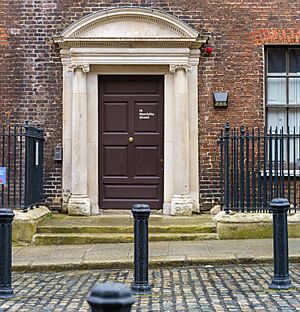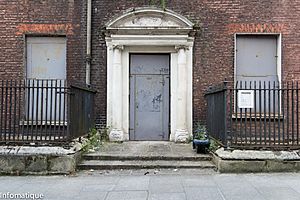14 Henrietta Street facts for kids

The Tenement Museum, 14 Henrietta Street
|
|
| Lua error in Module:Location_map at line 420: attempt to index field 'wikibase' (a nil value). | |
| Established | September 2018 |
|---|---|
| Location | 14 Henrietta Street, Dublin, Ireland |
| Type | Tenement, Georgian |
14 Henrietta Street is a special museum in Dublin, Ireland. It is sometimes called the Tenement Museum. This museum opened in September 2018. It tells the amazing story of a building that changed a lot over time. It shows how a grand house became home to many families.
Contents
The Story of 14 Henrietta Street
How the Building Was Built
Construction of Henrietta Street started in the 1720s. A man named Luke Gardiner bought the land. Numbers 13, 14, and 15 were built in the late 1740s. Gardiner built them to sell or rent.
Early Important Residents
The first person to live at Number 14 was Lord Richard Molesworth. He lived there with his second wife, Mary Jenney Usher. Other important people lived there in the late 1700s. These included Lord John Bowes and Sir Lucius O'Brien.
Changes Over Time
After the Act of Union in 1800, Dublin's economy slowed down. During the 1800s, 14 Henrietta Street was used by lawyers and courts. It even became a barracks for soldiers.
By 1877, a landlord named Thomas Vance owned the building. He removed the large staircase. He divided the house into 17 small flats. These flats had one, three, or four rooms. An advertisement from 1877 showed how these flats were rented. It mentioned gas, toilets on landings, and a drying yard.
A Home for Many Families
In the 1920s, an Irish Republican Army volunteer named Thomas Bryan lived there. In March 2023, Dublin City Council put up a special plaque to remember him.
Restoring the Building
Restoration work on the building began in 2006. It took more than ten years to finish. Dublin City Council owns and restored 14 Henrietta Street. The Dublin City Council Culture Company runs the museum. The house has been carefully restored. It now shows how it looked in its original Georgian period. It also shows how it looked as a tenement building.
What Were Tenements?
Life in Dublin's Tenements
Tenements in Dublin were usually old 18th or 19th-century townhouses. These large houses were changed to make many small flats. Often, these changes were not done very well. Many families would live in these buildings. Usually, one family lived in just one room. This single room would be used as a kitchen, a sitting room, and a bedroom.
These tenement houses were mostly in the north inner city of Dublin. Some were also on the Southside, near the Liberties. By the late 1800s, many people lived in the Georgian houses on Henrietta Street.
The End of an Era
By the end of the 1970s, fewer people lived at 14 Henrietta Street. Many of the seventeen flats had become empty. Some were made bigger. Eventually, a few temporary renters and some squatters lived there. They replaced the large community of families who once called it home. In 1979, 14 Henrietta Street officially stopped being used as tenements.
The Museum Experience
Exploring the Past
The 14 Henrietta Street museum is located in an 18th-century Georgian townhouse. The museum shares the story of how this grand building changed. It shows how it became a tenement house. It was once a home for some of Dublin's richest people.
Awards and Recognition
The museum opened in 2018. It has received several awards. In 2020, it won the Siletto Prize. This was for its work with the community at the European Museum of the Year Awards. The museum also won two RIAI Irish Architecture awards in 2018. These were for the best conservation project and the best overall project in Ireland. In 2024, the museum won an RIAI silver medal. This was for its excellent conservation and restoration work.
Images for kids
 | Bessie Coleman |
 | Spann Watson |
 | Jill E. Brown |
 | Sherman W. White |





